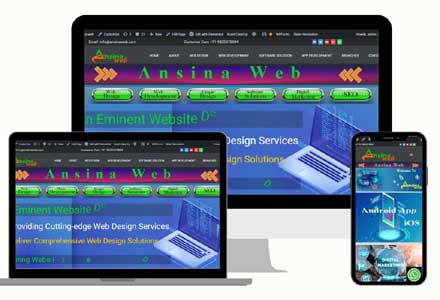Email- info@ansinaweb.com
Customer Care +91 9832070804
Email- info@ansinaweb.com
Customer Care +91 9832070804
Call- +91 9832070804
Web design is a complex and intricate process that goes beyond the mere creation of visually stunning websites. A successful website requires a wide range of skills and disciplines, including graphic design, coding, user experience design, and more. So, web designers must work tirelessly to achieve a delicate balance between aesthetic appeal, easy navigation, and overall functionality, ensuring that their websites offer a seamless user experience.

The ultimate goal of web design is to enhance business credibility, increase user engagement, and provide a top-notch user experience that will keep visitors coming back for more. This requires careful selection and implementation of design elements such as color schemes, typography, layout, and website features, while always keeping the target audience in mind. Web design should also be responsive, adaptable to different devices and screen sizes, and optimized for SEO to ensure that businesses can reach the widest audience possible.
In today’s competitive digital world, successfully executing web design can mean the difference between a lackluster online presence and a dynamic and thriving one. Without well-executed web design, businesses may struggle to attract and retain customers, ultimately impacting their overall success and bottom line.

If you are on the lookout for an informative website that can cater to all your knowledge-seeking needs, look no further! The internet is a vast space filled with websites that can provide you with knowledge about nearly any topic you may be interested in. You can find websites that offer insights into science, literature, history, technology, and so much more.
One of the best ways to find an informative website is by conducting a search engine query. Type in the topic you are interested in, and you will come across a plethora of websites that can provide you with information, articles, and scholarly works on the topic.
Some of the most informative websites include academic-based sites like JSTOR and Project MUSE, where you can access thousands of academic papers and books on almost any topic. Additionally, some websites like National Geographic can offer you reliable information about science, nature, and travel destinations around the world.
In conclusion, there is no dearth of informative websites on the internet. By conducting a simple search, you can find websites that cater to your knowledge needs and give you a wealth of information on any subject that interests you.

As professionals in today’s fast-paced digital age, having a strong online presence is crucial. A great way to showcase your work and skills is through a portfolio website.
When creating your portfolio website, there are a few key things to keep in mind. First and foremost, your website should reflect your style and brand. Choose a clean and visually appealing layout that is easy to navigate.
Make sure to include a variety of your best work samples to show off your creativity and range. It’s also important to include a brief bio and contact information for potential clients or employers.
To further enhance your website, you can also add testimonials from satisfied clients or colleagues. This can help establish credibility and trust with future clients.
Lastly, keep your website updated by regularly adding new work and updating your bio as needed. A portfolio website should be an evolving representation of your growth as a professional.
Overall, a portfolio website is a powerful tool to showcase your work and talent. Invest the time and effort to create a strong online presence that represents your brand and reflects who you are as a professional.

It cannot be denied that ecommerce websites have revolutionized and transformed the way businesses operate in the modern age. These platforms provide an opportunity for businesses to showcase their products and services online and reach a wider audience, without the need for a physical storefront. Furthermore, ecommerce websites are experiencing an incredible rate of growth due to the convenience and accessibility they offer. As such, it has become essential for businesses to embrace ecommerce and establish their presence in the digital marketplace.
However, designing an ecommerce website is no easy feat. It requires a comprehensive approach that prioritizes customer needs, mobile compatibility, branding, search engine optimization, and ease of use. A well-designed ecommerce website is easy to navigate, visually appealing, and user-centered. It should have clear calls to action buttons and a smooth checkout process that encourages customers to complete transactions.
When all these factors are put into consideration, the result is an efficient and effective ecommerce website that caters to the needs of the business owner and its clientele. Ultimately, with the growing importance of ecommerce, it is crucial for businesses to ensure they have a strong online presence to remain competitive in the ever-evolving digital marketplace.

Designing a great educational website is crucial to attract and engage your target audience. It is essential to create a website that offers both functionality and aesthetic appeal, while providing a seamless user experience.
First, understanding your target audience is key in designing an educational website. According to their age group, course and interest, your design and layout should be modified accordingly. Next, must adopt a user-friendly design, focusing on ease of navigation, clear fonts and colors, and concise information.
Including multimedia such as videos, podcasts, and images can serve up content in a more interesting and engaging way. Furthermore, an interactive platform can foster an active learning environment. Incorporating forums, discussion boards for students and teachers to communicate, as well as online quizzes and games, can make the website more engaging and educational.
In summary, creating an educational website that is both aesthetically appealing and functional, user-friendly and interactive, is paramount. By implementing these essential design elements, your website can leave a lasting and positive impression on learners.

Creating a news or blogging website can be both exciting and challenging. With the growing popularity of online journalism, it’s more important than ever to have a website that is not only informative but also visually appealing. Here are some tips for designing a successful news or blogging website:
1. Keep it simple – The aim of a news or blogging website is to deliver content to the readers in the easiest way possible. Therefore, the design should be simple, easy to navigate and not distracting.
2. Make it responsive – Your website should be accessible on any device, whether it is a desktop, tablet or a mobile device. Responsive design ensures that your website is readable and usable on any device.
3. Organize your content – Categorize your content and use a clear and concise language. Make sure your readers can find what they’re looking for quickly and easily.
4. Use images wisely – Images can make or break a website. Use them judiciously and ensure they are high-quality and relevant to your content.
5. Focus on readability – Choose fonts that are easy to read and ensure there is enough spacing between lines and paragraphs.
Creating a successful news or blogging website involves focusing on your readers and delivering content in the most effective way possible. Keep these tips in mind while designing your website, and you are on your way to a great website.

Customer Care- +91 9832070804
Email- info@ansinaweb.com
1st Floor, 108 Roy Mullick Colony, Dumdum Road Kolkata- 700030 West Bengal, India
Krishnanagar (Opposite of Judge Court), Nadia- 741101, West Bengal, India